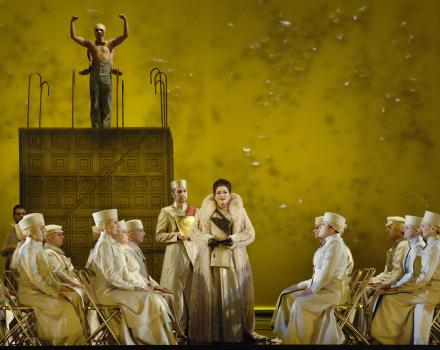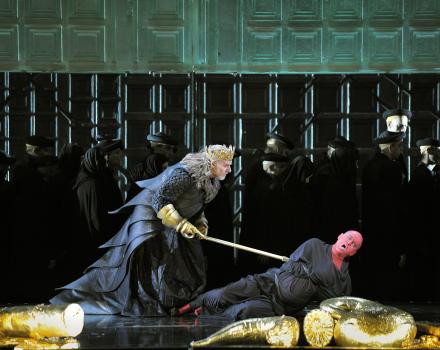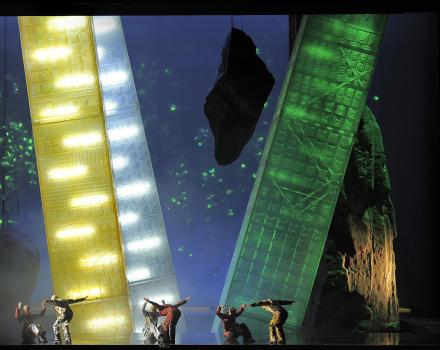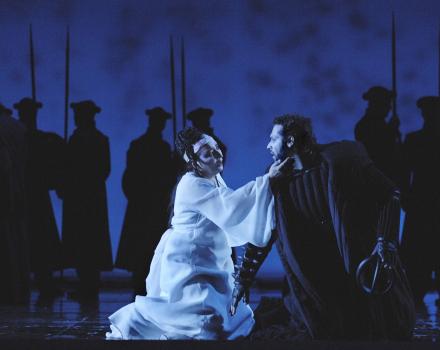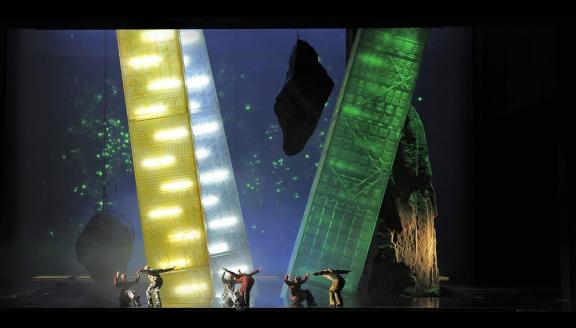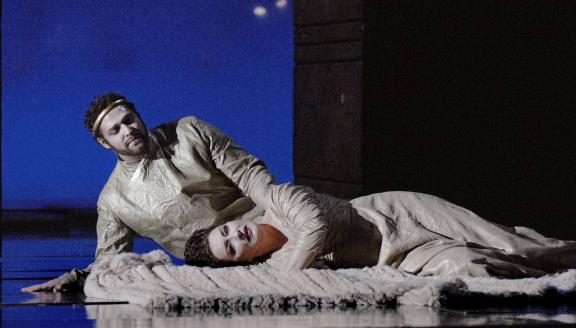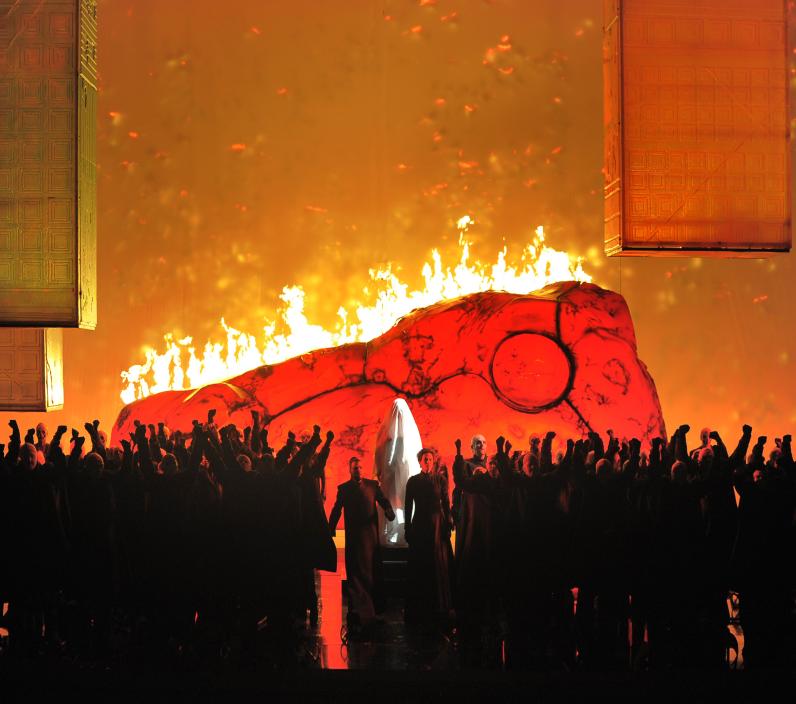

Pierre Audi directs Dutch soprano Eva-Maria Westbroek and American tenor Bryan Hymel in one of Berlioz's most ambitious operas.
Cast
|
Aeneas
|
Bryan Hymel
|
|---|---|
|
Chorebus
|
Jean-François Lapointe
|
|
Pantheus
|
Nicolas Testé
|
|
Narbal
|
Alastair Miles
|
|
Iopas
|
Greg Warren
|
|
Ascanius
|
Valérie Gabail
|
|
Cassandra
|
Eva-Maria Westbroek
|
|
Dido
|
Yvonne Naef
|
|
Anna
|
Charlotte Hellekant
|
|
Hélénus / Hylas
|
Sébastien Droy
|
|
Priam
|
Christian Tréguier
|
|
A griec chief / First sentinel
|
Alexander Vassiliev
|
|
A Soldier
|
Peter Arink
|
|
Second sentinel
|
Patrick Schramm
|
|
The shadow of Hector / The God Mercury
|
Philippe Fourcade
|
|
Sino
|
Christophe Gillett
|
|
Polyxenus
|
Michaëla Karadjian
|
|
Hecubus
|
Danielle Bouthillon
|
|
Andromache
|
Jennifer Hanna
|
|
Astyanax
|
Stijn Koene
|
|
Hector / Larbas
|
Standish de Vries
|
|
Television director
|
Misjel Vermeiren
|
|
Chorus
|
Koor van de Nederlandse Opera
|
|
Orchestra
|
Netherlands Philarmonic Orchestra
|
| ... | |
|
Music
|
Hector Berlioz
|
|---|---|
|
Conductor
|
John Nelson
|
|
Director
|
Pierre Audi
|
|
Sets
|
George Tsypin
|
|
Lighting
|
Peter van Praet
|
|
Costumes
|
Andrea Schmidt-Futterer
|
| ... | |
Video
The story
I. The Fall of Troy
Act I
After a siege of ten years, the Greeks finally leave Troy. The Trojans rejoice in their enemies’ departure. A giant wooden horse has been left behind, which the Trojans take to be an offering to the goddess Athena. Cassandra, daughter of King Priam, has dark premonitions; she foresees the bloody fall of Troy, but none pay heed to her, not even her father or her fiancé Chorebus. Priam orders one of the city gates to be demolished so that the horse can be brought into the city.
The priest Lacocoön also sees the giant horse as a cunning plot from the Greeks and urges the populace to set fire to it, only to be crushed to death by two monstrous snakes. The Trojans take this as Athena’s punishment of the priest. The giant horse is borne triumphantly into Troy.
Act II – Scene 1
Aeneas is asleep. The Ghost of Hector, the slain Trojan Hero, appears to him and warns him of the great fire that is about to rage through Troy. Aeneas must save the treasures of Troy and take all those who survive away with him; in Italy he will found a new Empire that will later come to rule the entire world. Pantheus rushes in, he tells Aneas that Greeks who were hidden in the belly of the horse have slain the city guards. The Greeks who had departed have returned and are invading through the opened gates. Priam is already dead. Aeneas, together with his son Ascanius and Chorebus, decides to save what can be saved.
Act II – Scene 2
The women of Troy understand that Cassandra had foreseen the truth, but it is now too late. In order neither to be taken prisoner nor dishonoured, they decide to die together with her.
II. The Trojans in Carthage
Act III
Dido, Queen of Carthage, celebrates with her people: it was seven years ago that she founded the city of Carthage after her brother had murdered her husband. The Numidian king Larbas is threatening to invade if she does not agree to marry him. Dido, however, remains faithful to her dead husband, even though she feels the pangs of loneliness.
Dido grants asylum to a group of Trojans in flight from Troy. Among them is Aeneas. He offers Dido his aid. Aeneas entrusts Ascanius to Dido’s care, after which the Trojans and the Carthaginians depart together under his leader ship to do battle against king Larbas.
Act IV
Dido and Aeneas take shelter from a storm. Dido has lost all care for government and only has eyes for her saviour. He must tell her more about the Trojans, especially about Andromache. Andromache was a widow like Dido, but after being abducted, she had finally married Pyrrhus, the son of Hector’s killer and himself the murderer of her father. Dido sees this as a precedent for the dissolution of her own vow of fidelity to her dead husband Sichaeus.
She is still uncertain, but her resistance is broken when Ascanius, disguised as Cupid, removes her wedding ring from her finger. The night casts its enchantment over all. Dido and Aeneas hymn the night as the embodiment of their mutual happiness. The god Mercury appears and reminds Aeneas of his mission: 'Italy' resounds three times.
Acte V
Preparations must be made immediately for departure in order not to offend the gods any further. The ghosts of Cassandra, Priam, Hector and Chorebus appear and tell Aeneas to make haste. All of the queen’s protests cannot make Aeneas stay. Alone, Dido resolves to die. She casts everything that reminds her of Aeneas onto a flaming pyre. As if in trance, she predicts the appearance of her avenger: Hannibal will avenge her death upon the Trojans’ descendants. Carthage nevertheless will eventually be destroyed. To the horror of all she stabs herself with Aeneas’ sword. As she dies, she has a final vision of immortal Rome. Her people swear eternal hatred for Aeneas and his people. A new war looms.
Insights
5 things to know about Les Troyens
1° An opera long considered unplayable
Les Troyens is an opera in five acts and nine scenes by Hector Berlioz. The French composer died before he could hear his full work, as Napoleon III cancelled the performance at the Paris Opera. For the premiere at the Théâtre Lyrique in Paris in 1863, the first two acts were cut and only the second part - The Trojans in Carthage - was played. This was because of the opera’s unusual length (almost 4 hours), but in particular its spectacular staging, involving frequent changes of scenery, and large orchestral and choral forces. It was not until 1890 that the full opera was performed, at the Karlsruhe Theatre in Germany, and even then it was divided into two distinct evenings. The first full-length performance happened at the King's Theatre in Glasgow in 1969.
2° Back to the roots
Berlioz had long thought about writing an opera on a theme from Antiquity; Les Troyens had a long gestation. Ruined and shattered by the resounding failures of his two previous operas (Benvenuto Cellini and The Damnation of Faust), Berlioz has to wait two years before writing Les Troyens. The Princess Carolyne of Sayn-Wittgenstein, a friend of Liszt, convinced him to start the project. Berlioz composed his own libretto, based on the text of Virgil's Aeneid. Berlioz returned here to his first literary loves, the great mythological tragedies. 'I have spent half my life among the demigods; I figure they knew me as much as I know them' he said in 1859. His dramaturgical style is purely classical: Alexandrines, inversions and archaisms run through the text.
3° Women of action
Female figures are of particular importance in Les Troyens. In the first part, The Siege of Troy, Cassandra takes the lead role. Isolated in the Greek and Roman myths, she is a heroic figure in Berlioz’s version, Chorebus’s lover then spouse. Resilient, armed, she defends her city before killing herself in order neither to be taken prisoner nor dishonoured, and encourages the other women to commit mass suicide. In the second part, The Trojans in Carthage, Dido is also the subject of her own story. A woman of power, isolated by her widowhood, governing Carthage. She then decides to put her passion for Aeneas above her government. Cassandra and Dido will both pay the ultimate price for their passion.
5° The production
OperaVision focuses on Pierre Audi for his last season as Artistic Director of the Dutch National Opera, a position he has held since 1988. He will leave in September 2018 to become General Director of the Aix-en-Provence Festival. Pierre Audi’s work as a stage director is minimalist and often radical in style. In this staging of Les Troyens, he decided to make the orchestra more visible: the stage extends around the pit, the orchestra is in the centre. He also set up opposite styles for the sets of each parts: horizontal for Troy, vertical for Carthage.
Eva-Maria Westbroek, one of the most acclaimed sopranos in the world, is Cassandra, Priam’s clairvoyant daughter. Bryan Hymel, the American tenor, made his debut in 2010 as Aeneas, Dido’s lover.
Gallery
